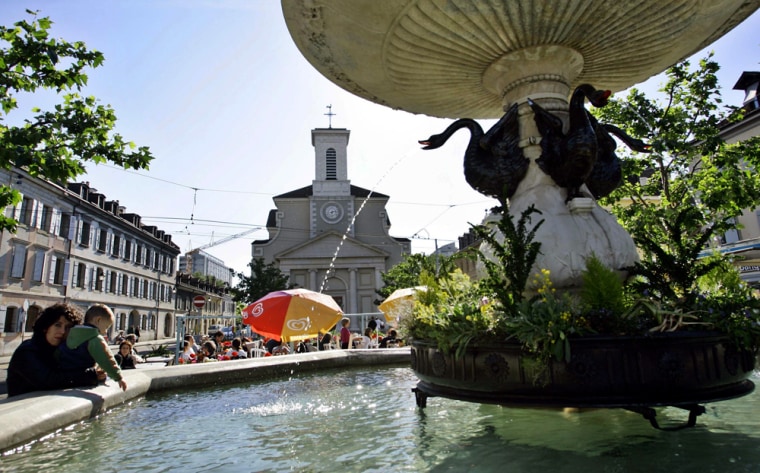The fast-flowing River Arve separates the city of Geneva from its nearby neighbor, Carouge.
But the laidback town is a world away in terms of architecture, atmosphere and history.
"People come to Carouge, they still feel this difference," said Gianna Mestermann, a guide who runs tours of the area. "It's a little like going on vacation. As soon as you leave Geneva, you're surprised by the architecture and the artisans you see working."
In the 18th century, the Arve was actually an international frontier, marking a border between Carouge, which belonged to the Italian realm of Piedmont, and the city-state of Geneva, which at the time was still heavily influenced by the austere 16th-century Protestant preachings of John Calvin.
King Victor Amadeus III, a Catholic ruler whose domain included Carouge, wanted to develop the tiny settlement into a trading rival to Geneva. But he needed more people, traders and craftsmen to boost his ambitious project.
"He wanted to build a town just at the doors of Geneva and to compete with Geneva," explained Mestermann over a cup of coffee in her Carouge office, which looks out on the town.
Over time, Carouge became a place where Catholics, moderate Protestants from Geneva, and Jewish traders fleeing persecution around Europe were able to live together peacefully.
Carouge today is considered a suburb of Geneva, as well as a destination for artisans and fashionable young city dwellers.
On the street, visitors can find artists' workshops, specialty stores and a plethora of brasseries, cafes and bars - a holdover from the days when alcohol and dancing were banned in Geneva, and its inhabitants would sneak over the Arve for a good time.
Historically, said Mestermann, "the Protestants came to Carouge because they liked to have fun now and then."
And Carouge is still the place to party. It's easy to cross the river by tram, and on weekend evenings, the bars of Carouge are packed with carousing young Genevois, while on the other side of the river, the nightlife tends to be more sedate, often catering to the city's legions of international businessmen and diplomats.
Carouge's unusual history is evident in its design. Architects from the Piedmontese capital, Turin, designed a chess board layout around a central market square. The tree-lined streets of the new town were lined with two- and three-story pastel-colored terraces, each one with regulation green shutters on its windows. The shutters can still be seen on many house fronts today.
Following the upheaval of the Napoleonic wars, Carouge was incorporated into Geneva, which joined Switzerland in 1816 - much to the displeasure of its inhabitants, who kept those green shutters closed on Swiss national day in protest.
Still, the town's independent atmosphere lingers. Those who take the short 10-minute tram ride from the center of Geneva find that Carouge's architecture, window boxes and relaxed atmosphere still evoke a quirky Mediterranean corner, particularly when compared to the austere buildings of Geneva's old town.
But the architecture in Carouge also conceals shady, private retreats - hidden courtyard gardens behind the facades.
"The idea was to build a garden town with the gardens on the interior," Mestermann said. "When you push a door, this is always a surprise."
The views are different, too. Without Geneva's lake, green parks or majestic views of the high Alps, Carouge huddles in the shadow of Mont Saleve's sheer face and lacks something of the spacious feel of the city center. But that seems to add to Carouge's close community, particularly in December when the narrow streets are thronged with shoppers at a traditional Christmas market.
"Carouge needs Geneva and Geneva needs Carouge," Mestermann summed up. "Geneva is the elegant lady already open to the world, and Carouge is the cheeky boy that everybody likes.
"They are both a complement to each other."
